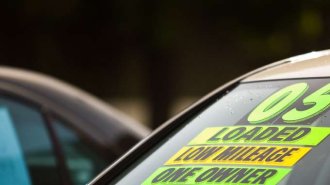
Used car advice is easy to come by. Getting a good deal at a used car lot is not that difficult if you know how to approach the negotiation; however, there are some misconceptions about how the negotiation process should be approached.
When at a used car dealership, never feel like you have to rush into buying the car. Many people feel like they have to negotiate a deal as soon as possible. In fact, the more patient you are the better price you will be able to negotiate for the vehicle. The dealer will always try to convince you that you need to buy the vehicle right away, as it may be gone if you leave and return. However, this is a common sales tactic and one you should not fall for. If the dealer is not willing to offer a price that you can live with, simply leave and make sure they have your phone number before you do. Chances are you will receive a follow-up phone call before you get home.
Even if you have your financing prearranged or are paying cash, never let the dealer know this. Most dealers earn money when they assist you with the financing of the vehicle; therefore, if you tell them you're paying cash or have your own financing, the dealer won't be as likely to negotiate a lower selling price as they will not be able to earn on the financing part of the deal. Besides, you should always listen to the dealer's pitch for financing—sometimes dealer pitches can be quite good.
You should always be aware that some dealers charge fees that could add hundreds of dollars to the cost of a used car. For example, many dealers charge prep or cleaning fees before you pick up the car from the lot. Always make sure to ask for all fees in writing and ask questions about each of them. The car should be clean when you buy it and you should not be charged for it. Any fees included in the price of the car should be considered, and the ones that are not truly relevant should be negotiated away.
The dealer wants you to fall in love with the car and buy it; therefore, he wants you to spend as much time next to the vehicle is possible. You can take away this dealer advantage by asking to sit down in the sales manager's office and negotiate the price there.
Believe it or not it will help you as well—the longer you stand beside the car you want, the more expensive the price you will be willing to pay for it. Give yourself a little breathing room and ask for discounts and other incentives in the sales manager's office and not out in the sun by the car.
One of the biggest fears for anyone buying a used car is winding up with a lemon. There are some simple ways to avoid this.
Make sure to examine the car you are looking at thoroughly. Test drive the vehicle, being sure to check the engine, steering, brakes and transmission for peculiarities. Have a history report done on the car's vehicle identification number to learn about any previous collisions the car may have been in. Look at the body for signs of mismatched paint on the fenders, and check the odometer for indications of tampering. Generally, a car should average about 10,000 miles for every year on the road. Depending on the age and residual value of the car, it may be a smart idea to purchase a warranty. Some basic car warranty advice is to look for a deal that allows you to use a mechanic of your choosing, check to see what type of mileage restrictions exist, and make sure that the warranty claim limit is at least what you would expect to pay for an average repair.
Getting stuck with a lemon can be discouraging and frustrating, but the risk of it happening to you shouldn't scare you away from buying a used car. If you follow this advice you should be on your way to making your next used car a rewarding experience.